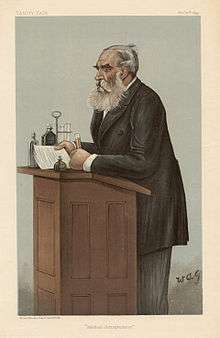Thomas Stevenson (toxicologist)
| Thomas Stevenson | |
|---|---|
 | |
| Born |
14 Apr 1838 Rainton, Yorkshire, England |
| Died |
27 July 1908 Streatham, London, England |
| Nationality | English |
| Fields | Toxicologist |
| Institutions |
Home Office Guy's Hospital |
| Alma mater |
University of London Guy's Hospital |
| Academic advisors | Mr Steel of Bradford |
| Notable students | Frederick Hopkins |
Thomas Stevenson (1838 – 18 January 1908) was an English toxicologist and forensic chemist.[1] He served as an analyst to the Home Office and in England he served as an expert witness in many famous poisoning cases. These included the Pimlico Mystery, The Maybrick Case, the Lambeth Poisoner, and the George Chapman case.[2]
In 1857 Stevenson became a medical pupil to Mr Steel of Bradford. He entered Guy's Hospital Medical School in 1859 and graduated MB, London, in 1863 and M.D. in 1864. He won several gold medals whilst a student. He became MRCP in 1864 and FRCP in 1871. Stevenson became demonstrator in practical chemistry at Guy's in 1864, and was lecturer in chemistry, 1870–98, and in forensic medicine, 1878-1908, in succession to Alfred Swaine Taylor (1806–80). He also served as the President of the Institute of Chemistry and of the Society of Public Analysts.
He is notable as the scientific mentor of the Nobel Prize winner Frederick Hopkins.
Stevenson died of diabetes on 27 July 1908 at his home in Streatham High Road, London and was buried at West Norwood Cemetery. One of his children became a medical missionary in India.
References
- ↑ "STEVENSON, Sir Thomas". Who's Who. Vol. 59. 1907. p. 1676.
- ↑ Obituary. Sir Thomas Stevenson, M.D., F.R.C.P. Brit. Med. J. 1908, 2, pp. 361–362.
- Dictionary of National Biography, Smith, Elder & Co., 1908-1986, 1901-1911, pp. 414–415
- Oxford Dictionary of National Biography by H. D. Rolleston, rev. N. G. Coley, Oxford University Press, 2004; online edn, Oct 2005
External links
-
 Works written by or about Thomas Stevenson at Wikisource
Works written by or about Thomas Stevenson at Wikisource - Stevenson biography